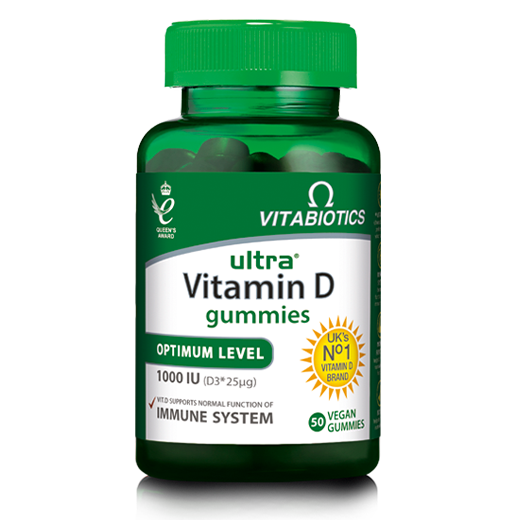Although sunshine is our main source of vitamin D, there are also foods high in vitamin D which we should try and include in our diet when we can.
However, because the list of vitamin D foods isn’t particularly extensive, a vitamin D supplement is useful, and often recommended, to help safeguard your intake of this essential nutrient.
What foods contain vitamin D?
It’s useful to know what foods are high in vitamin D. Oily fish such as mackerel, salmon and sardines, provide a good amount of vitamin D, as do cod liver oil supplements. Vitamin D from animal sources comes in the D3 form, which is the body’s preferred form. Plant-based sources of vitamin D such as mushrooms, contain vitamin D2.
Top 10 vitamin D foods
There are several foods high in vitamin D. This essential nutrient is measured in micrograms (µg). Below are the top 10 foods rich in vitamin D.
- 1 tsp of cod liver oil - 11.3 µg
- 85g of cooked salmon - 11.1 µg
- 85g of tinned salmon - 12.3 µg
- ½ cup of mushrooms exposed to UV light - 9.2
- 85g of drained, canned tuna in oil - 5.7 µg
- 85g of drained, canned sardines - 4.1 µg
- 1 cup of whole milk - 3.2 µg
- 1 cup of low/non-fat milks - 2.9µg
- 1 cup of fortified orange juice -2.5 µg
- 1 pork chop - 2.1 µg
Vitamin D foods for vegetarians and vegans
There are also several foods containing vitamin D which are suitable for vegetarians and vegans; these typically contain vitamin D2. Below are the top vitamin D foods for vegetarians and vegans.
- 1 cup of plant milk including almond, oat and soya milk - 2.5 to 3.6 µg
- ¾ cup of fortified cereals - 2.5 µg
- 1 cup of fortified orange juice - 2.5 µg
- 1 tbsp of margarine - 1.5 µg
- ½ cup of mushrooms - between 1.4 - 1.7 µg. The vitamin D content of mushrooms increases when they are exposed to UV light.
- 1 large hard boiled egg - 1.1 µg
What are vitamin D enriched or fortified foods?
Vitamin D fortified foods are foods that have had vitamin D added to them. They may otherwise not contain much vitamin D. Below are some examples of popular vitamin D fortified foods.
- 1 cup of plant milk including almond, oat and soya milk - 2.5 to 3.6 µg
- ½ cup of mushrooms exposed to UV light - 9.2 µg
- ⅓ to 1¼ cup of fortified cereals - 0.2-2.5 µg of vitamin D
- 1 cup of fortified orange juice - 2.5µg
-1 cup of fortified yoghurt - 3.2 µg
-1 cup of fortified tofu - 5.7 µg
How much vitamin D per day do you need?
It’s important to know how much vitamin D is required each day so you can ensure you’re getting enough.
How much vitamin D per day for adults?
The UK Department of Health recommends that adults -both men and women - should take a daily supplement containing 10 μg of vitamin D from October through to March.
In the UK, between April to the end of September, most people can fulfil this vitamin D quota from sunlight on their skin. But, as mentioned previously, during the darker months, this is not so easy and our vitamin D must be acquired through food and/or supplementation.
How much vitamin D for adults over 60?
It has been shown that adults over 60 may benefit from a daily vitamin D intake of 20 µg. This is to help reduce the risk of falls associated with postural instability and muscle weakness which can occur with age. Falling is a risk factor for bone fractures among men and women 60 years of age and older.
How much vitamin D for pregnant women?
Pregnant and breastfeeding women should take a daily vitamin D supplement containing 10 µg, as advised by the Department of Health. This should be taken from September through to March.
How much vitamin D for babies and children?
The Department of Health recommends that babies who are breastfed from birth up to one year old, should be given a daily vitamin D supplement containing 8.5 to 10 µg. This is whether or not you are (the breastfeeding mother) taking a supplement containing Vitamin D yourself.
Babies who are given formula rather than being breastfed should only be given a supplement when they’re consuming less than 500ml of formula a day. This is because infant formula is already fortified with vitamin D.
The UK Department of Health also recommends that children aged one to four years old should be given a daily supplement containing 10 µg of vitamin D.
From the age of four years onwards, it is advised that children are given a daily supplement containing 10µg of vitamin D between the months of October and March.







Comments (0)